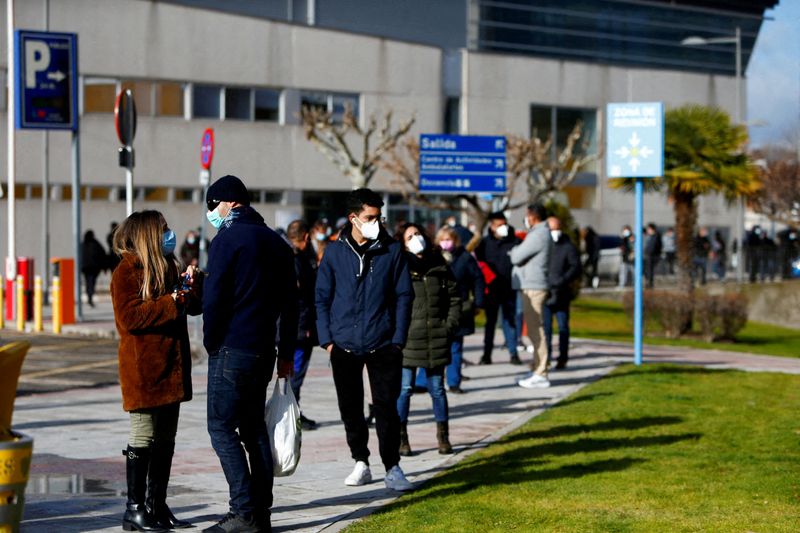By Nancy Lapid
(Reuters) - The following is a summary of some recent studies on COVID-19. They include research that warrants further study to corroborate the findings and that has yet to be certified by peer review.
Many people could still be infectious after 5-day quarantine
After a five-day quarantine, about a third of people infected with SARS-CoV-2, the coronavirus that causes COVID-19, might still be infectious, according to new data. PCR tests detect virus particles but cannot tell whether they are infectious or merely inactive remnants. For a study using samples obtained from March through November 2020, researchers used a new test. In sequential samples from 176 people with positive PCR tests, they looked for genetic material that the virus produces when it is actively making copies of itself and is still transmissible. "At five days, 30 percent of people still exhibited clinically relevant levels of potentially active virus," said study leader Lorna Harries of the University of Exeter Medical School in England. After a 10-day quarantine, one in 10 people might still be infectious, her team reported on Thursday in the International Journal of Infectious Diseases. Some people retained these levels for up to 68 days, the researchers said. "There was nothing clinically remarkable about these people, which means we wouldn't be able to predict who they are," Harries said in a news release. The study was conducted before the Delta and Omicron coronavirus variants began circulating last year. The researchers intend to conduct larger trials to confirm their findings. In the meantime, they suggest, in facilities "where onward transmission would be especially problematic, it may be prudent to obtain molecular evidence of remission to prevent ongoing transmission."
Vapers risk more symptoms from COVID-19
E-cigarette users infected with the coronavirus may be more likely than infected non-vapers to experience COVID-19 symptoms, according to research published in the Journal of Primary Care & Community Health (NYSE:CYH). The researchers compared 289 vapers with 1,445 people of similar age and gender who neither vaped nor smoked tobacco, all of whom had tested positive for the coronavirus on PCR tests. Compared to infected non-vapers and after accounting for participants' other risk factors, infected vapers experienced higher rates of chest pain or tightness (16% versus 10%), chills (25% versus 19%), body aches (39% versus 32%), headaches (49% versus 41%), problems with smell and taste (37% versus 30%), nausea/vomiting/abdominal pain (16% versus 10%), diarrhea (16% versus 10%) and light-headedness (16% versus 9%). "Our research was not designed to test whether e-cigarette use increases the risk of acquiring COVID infection, but it clearly indicates that symptom burden in patients with COVID-19 who vape is greater than in those who do not vape," study co-author Dr. Robert Vassallo of the Mayo Clinic in Rochester, Minnesota, said in a news release. The inflammation caused by the coronavirus and the inflammation induced by vaping may combine to worsen the likelihood of inflammation throughout the body, with a resulting increase in symptoms, Vassallo and his colleagues suggested.
Experimental drug targets COVID-19 from two angles
An experimental drug originally being developed to treat influenza is showing promise against SARS-CoV-2 and might defend against COVID-19 from two different directions, researchers said. The drug, called zapnometinib or ATR-002, could potentially curb the proliferation of the virus in cells and also reduce the exaggerated immune response that contributes to critical illness in severe cases of COVID-19, test tube experiments indicated. The data, published on Thursday in the journal Cellular and Molecular Life Sciences, provided the basis on which the German Institute of Drugs and Medicinal Products gave manufacturer Atriva Therapeutics its approval for the drug to be tested in people. This marks the first time any drug has been shown to have a dual action against COVID-19, study co-author Stephan Ludwig of the University of Muenster said in a news release. "Positive results from the still-ongoing clinical study in humans might already lead to an emergency approval this year," Ludwig said.
Click for a Reuters graphic https://tmsnrt.rs/3c7R3Bl on vaccines in development.
